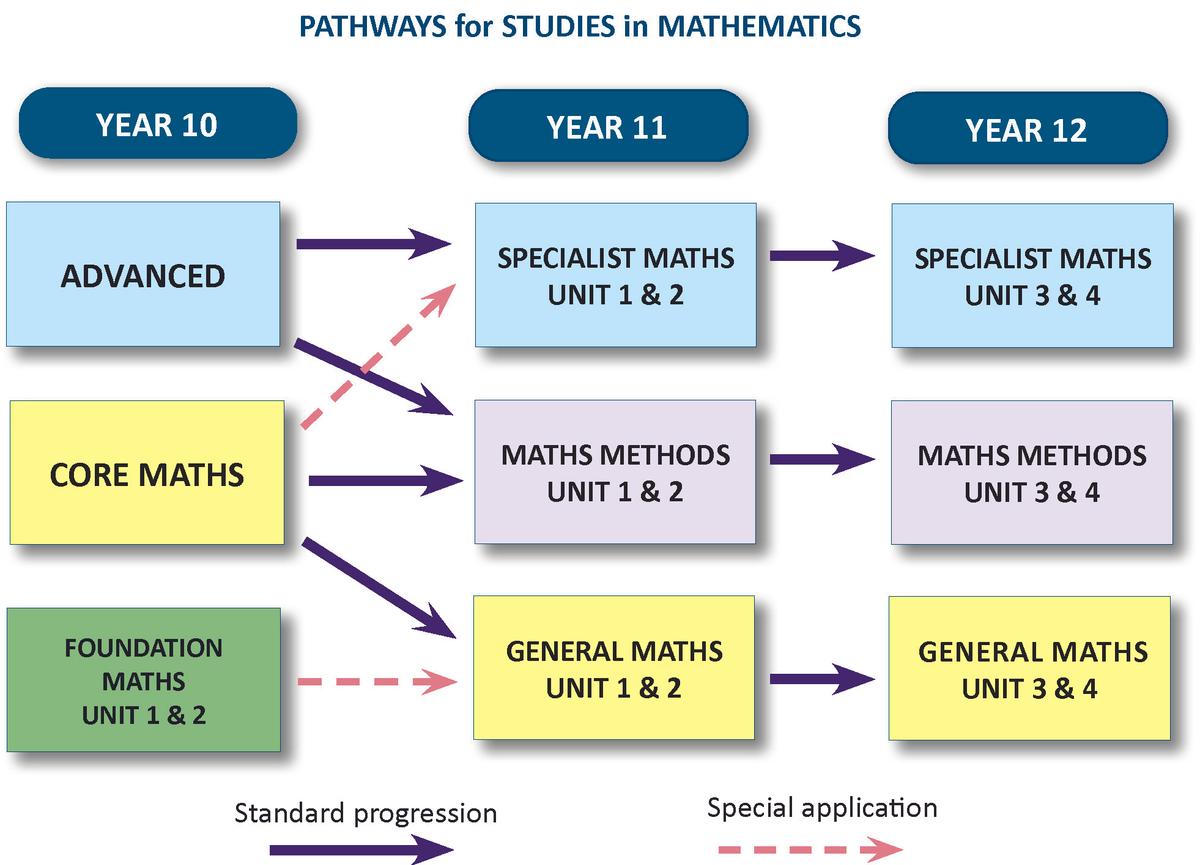Mathematics
This is a compulsory study at year 10.

Mathematics
This is a compulsory study at year 10.
There are three streams of Mathematics that will cater for the range of ability that students may have. They are Core Mathematics, Advanced Mathematics and VCE Foundation Mathematics. The majority of students in year 10 will study Core Mathematics.
Some students will be invited by the Mathematics Domain to study Advanced Mathematics.
Other students at this level may be advised by their Year 9 Mathematics Teacher to study VCE Foundation Mathematics (Units 1 & 2).
These study options will be determined in consultation with the students and be based on students’ application to their studies, their mathematics ability and their performance in year 9 Mathematics test, assignments and exams.
Strand | Unit | |
Core | Mathematics | Core Math |
Advanced Maths | ||
Foundation Maths Unit 1 & 2 |


While the curriculum content for both Core Mathematics and Advanced Mathematics cover similar topics and the same dimensions, the Advanced Mathematics class will work more quickly through the core coursework, complete topics in more depth and explore introductory topics from VCE Maths Methods and Specialist Maths. Both Core and Advanced Mathematics classes have an emphasis on the skills required for further study of VCE Maths Methods, Specialist Maths or General Mathematics. Selection into the Advanced Mathematics class is based on student CAT / NAPLAN / PAT testing results and teacher feedback.
Aim
Number and Algebra
They solve problems involving linear equations and inequalities, quadratic equations and pairs of simultaneous linear equations and related graphs. Students substitute into formulas, find unknown values, manipulate linear algebraic expressions, expand binomial expressions and factorise monic and simple non-monic quadratic expressions, with and without the use of digital technology. They represent linear, quadratic and exponential functions numerically, graphically and algebraically.
Measurement and Geometry
Students solve and explain surface area and volume problems relating to composite solids. They use parallel and perpendicular lines, angle and triangle properties, similarity, trigonometry and congruence to solve practical problems and develop proofs involving lengths, angles and areas in plane shapes.
Statistics and Probability
Students compare univariate data sets by referring to summary statistics and the shape of their displays. They describe bivariate data where the independent variable is time and use scatter-plots generated by digital technology to investigate relationships between two continuous variables. Students evaluate the use of statistics in the media.
Additional topics for Advanced Maths
Special conditions
Students should retain their CAS (computer algebra system) calculator from year 9 as it will be a key resource for their year 10 and subsequent VCE maths studies.
Assessment
All students will complete CATs, topic tests, problem solving tasks, regular homework assignments and two end-of-semester exams.
Additional
Students will be encouraged to enter/participate in external set competitions held throughout the year.
Entry into Foundation Maths in Year 10 is by invitation from the school based on consideration of the students performance in year 9 Maths and in consultation with the student and their parents. The course viability is subject to sufficient students accepting the offer of a place. If this subject does not run then students will be catered for in core Year 10 Mathematics.
Units 1 & 2 special conditions
Students are recommended to take this course based on their year 9 Mathematics performance. This course does not progress to any Unit 3 & 4 Mathematics course.
General information
VCE Foundation Mathematics (Units 1 & 2) provides for the continuing development of students who need mathematical skills to support their other VCE subjects. Following successful completion of Foundation Mathematics some students elect to study VCE General Maths (Units 1 & 2) in their year 11 program.
VCE Foundation Mathematics (Units 1 & 2) has a strong emphasis on using mathematics in practical contexts relating to everyday life. Students are encouraged to use appropriate technology in all areas of their study. Success in this course of study enables only limited choice for students intending to study VCE General Mathematics (Units 1 & 2).
Foundation Mathematics Units 1 and 2 focus on providing students with the mathematical knowledge, skills, understanding and dispositions to solve problems in real contexts for a range of workplace, personal, further learning, and community settings relevant to contemporary society. Students are encouraged to use appropriate technology in all areas of their study.
The areas of study for Foundation Mathematics are:
The award of satisfactory completion for a unit is based on whether the student has demonstrated achievement of the set of outcomes 1, 2 and 3 listed below. All assessments at Units 1 and 2 are school-based, are a part of the regular teaching and learning program, and completed mainly in class and within a limited timeframe. The decision will be based on the teacher’s assessment of the student’s overall performance on assessment tasks designated for the unit. Example assessment tasks include - Outcome 1: Assignments, summary or review notes, tests Outcome 2: A report on an application or use of mathematics, a presentation in oral, written, poster, or multimedia format Outcome 3: Effective and appropriate use of technology in contexts related to topics in the selected material from the areas of study.
Outcomes for satisfactory completion:
Outcome 1
- to be able to use and apply a range of mathematical concepts, skills and procedures from selected areas of study to solve practical problems based on a range of everyday and real-life contexts.
Outcome 2:
- to apply mathematical processes in non-routine practical contexts, including situations with some open-ended aspects requiring investigative, modelling or problem-solving techniques or approaches, and analyse and discuss these applications of mathematics.
Outcome 3
- to be able to apply computational thinking and use numerical, graphical, symbolic and statistical functionalities of technology to develop mathematical ideas, produce results and carry out analysis in practical situations requiring investigative, modelling or problem-solving techniques or approaches.